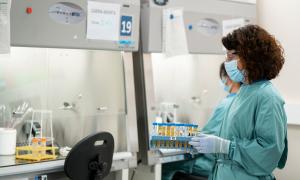New antiviral paves the way to HIV cure: less reservoir, inflammation and chronic immune system activation

The triple effect of obefazimod would make the drug a potential candidate when designing HIV remission strategies
Access to antiretroviral treatment allows people living with HIV to lead a life virtually identical to that of people living without the virus. However, although latent, the virus persists in the body, and one of the main challenges posed by the scientific community is to eliminate it completely from the body. Recently, a study led by the IrsiCaixa AIDS Research Institute –a centre jointly promoted by the "la Caixa" Foundation and the Department of Health of the Generalitat de Catalunya– and carried out in close collaboration with the Fight Infections Foundation has shown, in a phase 2 clinical trial with people with HIV and taking antiretroviral treatment, that a new drug called obefazimod is effective in reducing the persistence of HIV in the body, as well as the chronic activation of the immune system and inflammation. The triple effect of obefazimod would make the drug a potential candidate when designing HIV remission strategies.
People living with HIV and taking antiretroviral treatment, despite having undetectable virus in their blood, harbour viral particles in their bodies that remain hidden and therefore force the immune system to be in a constant state of alarm. This, in turn, leads to inflammation. "From previous studies, we sensed that obefazimod could help us fight against these characteristic features of HIV infection, improving the overall condition of the individual and paving the way for future HIV cure strategies", says study leader Javier Martinez-Picado, ICREA researcher at IrsiCaixa.
Clinical trial proves drug's antiviral safety and anti-inflammatory function
"Obefazimod uses a completely innovative mechanism of action in the field of HIV. Specifically, it prevents the production of proteins essential for the creation of new HIV particles from the RNA of the virus, that is, its genetic material", explains the first author of the article, Sílvia Bernal, researcher on the project during her PhD thesis at IrsiCaixa. At the same time, the drug triggers the activation of anti-inflammatory pathways. To evaluate the effect of the drug on people living with HIV, the scientific team conducted a phase 2 clinical trial in which 24 people with HIV who were taking obefazimod in addition to standard antiretroviral treatment were followed up. These individuals were compared with a control group of 12 HIV-negative people taking only obefazimod.
"During the study, people with HIV who were administered obefazimod in addition to their antiretroviral therapy regimen showed a reduction in the total HIV reservoir, a reduction in free viral particles and a lower presence or attenuation of biomarkers of immune activation and inflammation. In fact, these results were more accentuated with higher doses of the drug", says the physician and principal investigator at IrsiCaixa Roger Paredes, one of the study's authors. Another key point of the study was the confirmation of the safety and tolerability of obefazimod.
A catalyst for HIV remission
The results obtained from this study are particularly relevant given that it is one of the strategies that has worked best so far in reducing the size of the reservoir. "All in all, we perceive the drug as a possible complementary tool to the current HIV treatment, which could help us to minimize the persistence of the virus and avoid the complications derived from chronic inflammation", concludes IrsiCaixa researcher Mª Carmen Puertas, one of the authors of the article.